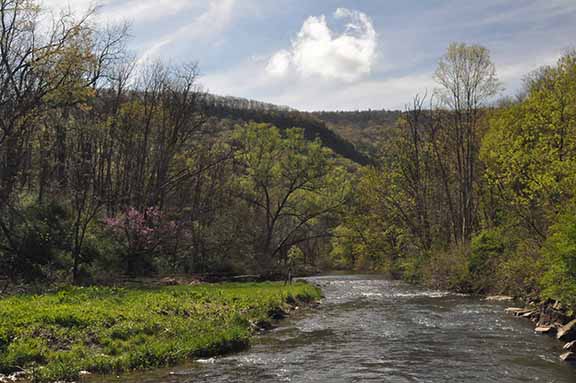IMAGE OF THE WEEK

Spruce Creek in spring. By Rob Brooks. Send your photos from fieldwork and travel to geography@psu.edu to be featured as our image of the week
GOOD NEWS
Andrew Carleton and his students, Adrienne Tucker and Jase Bernhardt, attended the 95th Annual Meeting of the American Meteorological Society in Phoenix in January. Tucker won the Best Student Paper Award in the Conference on Planned and Inadvertent Weather Modification, and Bernhardt won the Best Student Paper Award in the History Symposium.
Ashlee Adams and Sara Cavallo each passed her masters thesis defense last week.
Sterling Quinn has been nominated for “2015 GeoForAll Global Educator of the Year Award” for his course: GEOG 585: Open Web Mapping.
Nari Senanayake passed her candidacy exams and also received the SSRC Dissertation Proposal Development Fellowship and the American Institute for Sri Lankan Studies’ Dissertation Planning Grant.
NEWS
Coffee Hour: Budhendra Bhaduri “Landscape Dynamics, Geographic Data and Scalable Computing: The Oak Ridge Experience”
Understanding change through visualization of landscape processes often provide the most effective tool for decision support. Current geoanalytics are limited in dealing with temporal dynamics that describe observed and/or predicted behaviors of entities i.e. physical and socioeconomic processes. End point based temporal analysis can capture events signified by broad changes in observable earth features; but are inadequate for revealing temporal characteristics of the processes as defined by the onset, frequency, and rate of changes in the features.
- 3:30 to 5:00 p.m.
- Refreshments are offered in 319 Walker Building at 3:30 p.m.
- The lecture begins in 112 Walker Building at 4:00 p.m.
- Coffee Hour To Go
- Next Week: Rinku Chowdhury “The homogenization of (sub)urban America? A comparative approach”
Many Penn Staters presenting at the AAG annual meeting
More than 65 students (graduate and undergraduate), faculty, and staff from the Department of Geography are presenting at the AAG annual meeting in Chicago, Illinois, April 21–25, 2015. View a spreadsheet to see who’s presenting when and where.
RIT professor creates better maps for navigating disasters in
Syrian refugee camp
Geographic Information Systems used in NSF-funded project
Brian Tomaszewski (Ph.D. ’09) hopes to make riots, fires and sand storms a little easier to manage at the Zaatari Syrian refugee camp in Jordan. The assistant professor of information sciences and technologies at Rochester Institute of Technology spent a week of his winter break in Jordan, looking at how geographic information systems (GIS) and mapping can be used to mitigate potential emergency and disaster situations that threaten life at the refugee camp. The trip was part of a collaborative National Science Foundation (NSF)-funded project to examine the camp’s current infrastructure, look at ways to improve it and apply those ideas to other refugee camps.
Recently (or soon to be) published
Stehle, S., & Peuquet, D. J. (2014). “Analyzing Spatio-Temporal Patterns and Their Evolution via Sequence Alignment.” Spatial Cognition & Computation: (in press) Special issue on spatio-temporal theories and models for environmental, urban and social sciences: where do we stand?
“The impacts of long-lived jet contrail ‘outbreaks’ on surface station diurnal
temperature range”
By Jase Bernhardt and Andrew Carleton
In International Journal of Climatology doi:10.1002/joc.4303
Multiple persistent jet aviation contrails – contrail ‘outbreaks’ – occur frequently over certain portions of the Continental United States (CONUS). The artificial cloudiness generated by contrail outbreaks alters the atmospheric radiation budget, potentially impacting the surface air temperature, particularly the diurnal temperature range (DTR), or difference between daytime maximum and nighttime minimum temperatures. This study evaluates the hypothesis that contrail outbreaks reduce the DTR relative to clear-sky conditions. We utilize a database of longer-lived (>4 h duration) jet contrail outbreaks for the CONUS previously determined from interpretation of high-resolution satellite imagery, for the January and April months of 2008 and 2009.
DOG OF THE WEEK
Last week’s dog was Libby, companion to Arielle Hesse. Send a photo of your dog to geography@psu.edu for our mystery dog of the week!
